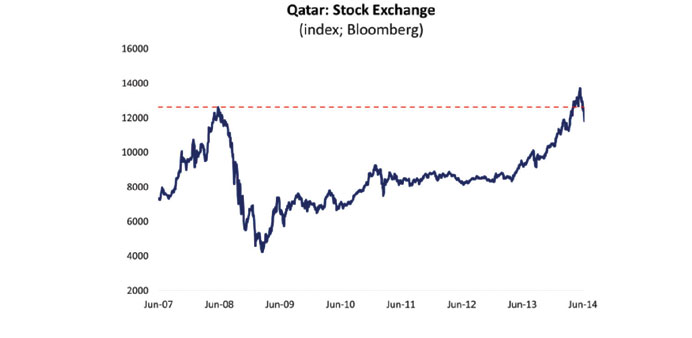By Pratap John
The Qatar Stock Exchange’s MSCI upgrade and the higher foreign ownership cap should attract more institutional investment from outside of Qatar, Samba Financial Group has said in a report.
After breakneck growth in the first half of 2014, the Qatar Stock Exchange slipped 13.7% in June as investors booked profit and geo-political concerns tainted sentiment. Despite the recent slip, the QSE was up 13.8% year-to-date (YTD) as of June 30.
The price earnings ratio is at 14.7, which looks to be in line with other regional bourses. The figure has come down from 15.7% in May following the fall in June. The rapid growth over the previous 12 months was caused by the announcement of the bourse being reclassified from ‘frontier’ to ‘emerging’ by the MSCI. This was formally implemented on June 1, but the announcement in June of last year had already helped generate sustained gains.
“These have been driven by the expectations of investor inflows of around $500m into the bourse, mainly from funds that passively track the emerging market index. With investors demonstrating increased discrimination between EMs following the generalised sell-off at the start of the year, Qatar’s macroeconomic strengths are likely to be appreciated by investors, though they will likely look for further progress on corporate transparency,” Samba said.
Despite the “heightened geo-political concerns” in the region, with the troubling developments in Iraq and the corruption allegations surrounding the World Cup, risk metrics for Qatar are largely unmoved. The CDS spread has ticked up just two bps on the dollar, but remains well down year-to-date; likewise bond yields have increased only slightly.
In May, HH the Emir announced the raising of foreign ownership caps from 29% to 49%. This is one of the issues that had stopped an earlier MSCI upgrade and is seen as a major step forward for investment in the region. Each individual company must decide as to whether they implement the change, which must then go through board approval, delaying any immediate impact.
“Both the MSCI upgrade and the higher foreign ownership cap should attract more institutional investment from outside of Qatar. Although one could argue the downside risk is an increased exposure to external events, it is likely to help stabilise the market as it promises to attract institutional inflows rather than those from the more volatile, locally-domiciled investors. This should be seen as a precursor to a better regulated and more stable stock exchange, which should help in achieving Qatar’s long term vision of becoming a regional financing hub,” Samba said.

